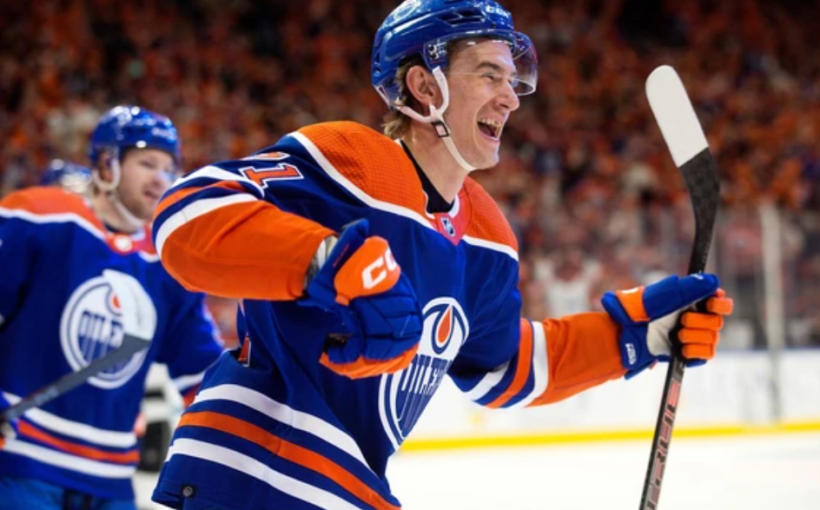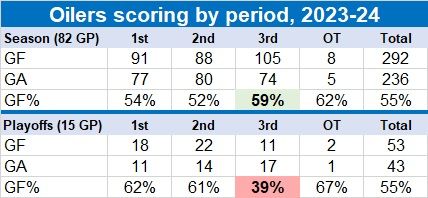Edmonton Oilers will be making line-up changes for tonight’s crucial Game 4 vs. Dallas Stars, coach Kris Knoblauch revealed on Wednesday morning. But beyond yesterday’s confirmation that Stu Skinner will keep the net, he wouldn’t tip his hand as to exactly what those changes might be.
There was, however, a trail of bread crumbs left by a generally reliable indicator. Who stayed late for extra work after the game day skate?
Most prominent among them is the potential change on the back end after 15 games of the same six-man group. As detailed in this post yesterday, three of the six have been struggling mightily, both by eye and by the all-important measure of goals for/against. We also learned that would-be #7 defender Troy Stecher has been ruled out with an ankle injury that requires surgery. If the bread crumbs are to be believed, Philip Broberg will suit up in place of Vincent Desharnais. Where he lines up is another question.
The big issue here is that Broberg is a left-shot, Desharnais a righty, meaning that for the first time these playoffs the Oilers won’t have three of each on the back end. Broberg has limited experience playing his off side; for all that he got heavy minutes in Bakersfield this season, most of them were on his natural side, even when paired with another lefty.
Best guess here is that Brett Kulak will make the switch and most likely pair up with Darnell Nurse, with one of them, likely Kulak, playing on his off side. In that scenario Broberg would partner with righty Cody Ceci on what may prove to be a limited-minutes third pairing. The first pair of Mattias Ekholm and Evan Bouchard will surely stay together, and may well play heavy minutes. Not impossible that each will get occasional extra shifts with other partners.
Who will take Desharnais’ spot on the penalty kill? Could be Kulak, the #5 PKer among regular d-men who fills in when one of the four regulars is in the box. Broberg has plenty of experience in the discipline, though not in the pressure cooker of the NHL playoffs. The 22-year-old does have 10 games of NHL postseason experience, though just 65 minutes in total including just 20 seconds on the kill.
A tough decision for the coach, and a tough birthday for Desharnais, who turns 28 today.
There were no line rushes at the morning skate, leaving zero clues as to who will pair up on the back end or to line combinations up front, where it appears Ryan McLeod will draw back in after a one-game absence. To these eyes Oilers missed his speed in Game 3, especially noticeable in a game that speedster Roope Hintz rejoined the Stars’ line-up after missing the start of the series with injury.
While both are billed as defensive centres, McLeod is a very different player from the man he seems set to replace, Sam Carrick. McLeod is long, lean, left-handed, and skates like the wind. Carrick is a right-shot grinder who is most at home in the trenches that McLeod is often accused of skirting. The younger man will have plenty of motivation to deliver a complete game after his first healthy scratch in memory.
Whereas the insertions of Broberg and McLeod will add to team speed, the same can’t be said for the change at wing. Corey Perry wasn’t fast when he was in his prime, never mind now that he’s 39 with a million miles on the odometer. He does, however, bring heaping helpings of guile and grease, not the worst attributes against these Stars. And he will surely be pumped to be a difference-maker after 5 games in the press box.
Sounds like he’ll replace Warren Foegele, who has had his moments including a fierce forecheck that enabled Adam Henrique‘s tying goal in Game 3. Alas, he’s also had other moments with less fortuitous outcomes, and more of them. Foegele’s goal share these playoffs is just 3 for, 11 against in 158 minutes at 5v5, and a dreadful +9/-23 during his three playoff years as an Oiler. With an empty-net goal in the first game of the 2024 playoffs and none since, his 20-goal season seems like a mirage.
Ultimately, however, these changes at the bottom of the roster are a small-ish part of the bigger picture. In order to beat the Stars, the Oilers will require a full team effort, and for the full 60 minutes. That latter objective has evaded them at times these playoffs, never more so than in Game 3 when the squad resembled the Glen Sather-era Oilers in the first period, then the Pat Quinn-era Here Come The Oilers in the second. They recovered their equilibrium but still found a way to lose in the final frame.
Our assessment of Grade A shots here at the Cult of Hockey tells a tale. In Game 3, the Oilers yielded 1 Grade A in the first period, 15 (!) in the second, and 1 in the third. Simply put, the Oilers completely fell apart for the first half of the middle frame, in the process losing their grip on the hockey game.
It was the fourth time in the last two series (10 games) that Edmonton has blown a multi-goal lead. In Game 1 at Vancouver they lost from 4-1 ahead, mustering 0 shots on net after the fourth goal until Vancouver forged ahead 5-4 in the third, a score that held to the end. In two other games, Game 4 vs. Vancouver and Game 1 at Dallas, 2-0 leads disappeared, though the Oil ultimately won both on a Bouchard goal in the 60th minute and a McDavid tally in the 81st. Then there was Game 7 at Vancouver where a solid 3-0 lead melted down to 3-2 before Edmonton ultimately hung on for the nail-biting win.
The third period has been a problem throughout the playoffs, especially in the current series where the Oilers have been outscored 5-0. Two of those are empty netters, but those aside the Oil have been outscored 1-0 in all three final frames, blowing a one-goal lead in Game 1 and losing both Games 2 and 3 from a tied position after 40 minutes.
It’s been a stark contrast from the regular season, where the third period was Edmonton’s best at both ends of the sheet.
Overall, Edmonton has maintained the same 55% goals share in the post-season as during the regular. But the distribution is wildly different, with production way down in the third period and goals against way up.
That needs to change if the 2024 Oilers are to emerge as Stanley Cup contenders.




